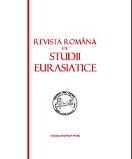EAST EUROPEAN BORDERS SYMPTOMATOLOGY – ECONOMIC AND POLITICAL IMPLICATIONS OF CONTEMPORARY GEOPOLITICAL CLEAVAGES
EAST EUROPEAN BORDERS SYMPTOMATOLOGY – ECONOMIC AND POLITICAL IMPLICATIONS OF CONTEMPORARY GEOPOLITICAL CLEAVAGES
Author(s): Iulia AnghelSubject(s): International relations/trade, Post-Communist Transformation
Published by: Ovidius University Press
Keywords: neo-modernization; democratic consolidation; post-communism; etatism; authoritarianism; transition; geopolitical fragmentation
Summary/Abstract: Eastern Europe is faced with increasingly numerous and severe geopolitical rifts following the conflict in Eastern Ukraine. The reopening of tension rifts, which largely reiterates the old Cold War configuration, triggers a large number of questions regarding the likely evolution of former Communist states. The study aims to identify the political and economic implications determined by the abrupt changes at the level of disputed borders, at the meeting point of two spheres of influence: Russia’s authoritarian neo-modernity and the old democratic oikumene of Central and Western Europe. The research starts from two working hypotheses. The first argues for the existence of major correlations between the reopening of geopolitical cleavages and the structural limitations of the process of modernization, whereas the second relates to the emergence of relevant connections between leadership typology and consolidation or reversibility tendencies in post-communist societies.
Journal: Revista Română de Studii Eurasiatice
- Issue Year: 11/2015
- Issue No: 1+2
- Page Range: 147-162
- Page Count: 16
- Language: English

